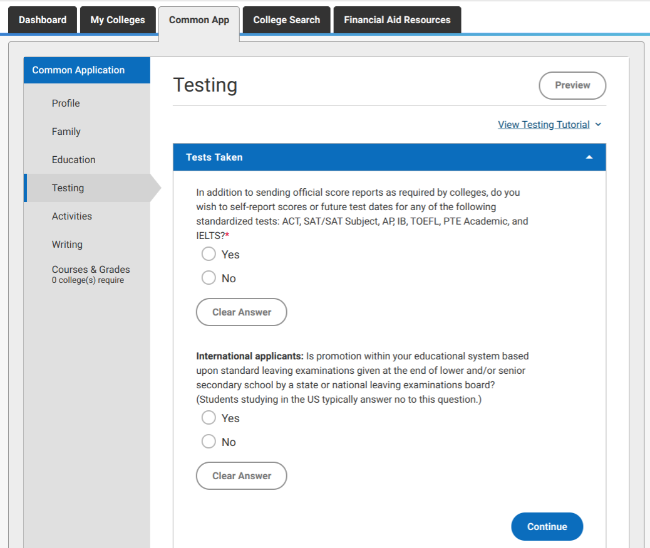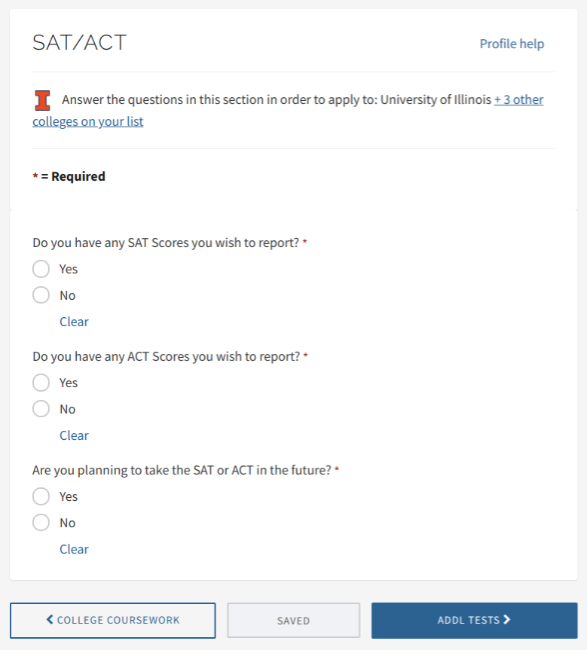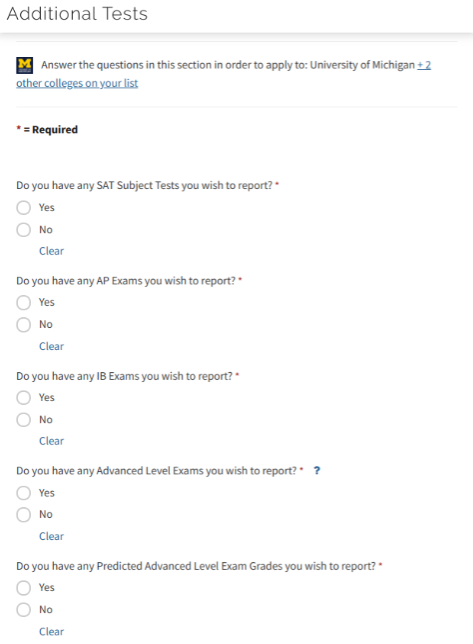Should You Self Report Scores On Common App
You've taken the SAT/ACT and are ready to send your scores to colleges. But did you know that not all colleges require official score reports? That's right—m any colleges are now letting applicants self-report their scores directly on their applications (and only requiring an official score report if they choose to enroll). But what does self-reporting test scores mean? We answer this critical question here and also give you a list of popular colleges that allow self-reporting. Additionally, we'll go over how to self-report scores using the Common Application and Coalition Application. What is self-reporting test scores? Simply put, it's the act of reporting any scores you earned on specific tests directly on your college application without having to send in official score reports from testing agencies or your school. In other words, you do not need to go through the process of having to pay for and submit official score reports to your colleges; you can just manually type in the scores you got on your tests on your application. The college will then use these unofficial test scores to help make an admissions decision. Self-reporting can be done for the following tests, among others: You can self-report your scores on the Common Application and Coalition Application (we'll go over how to do this later). Other colleges might ask you to self-report scores via their application system or by taking a screenshot of your online score report and sending that in with your application. Now, not all colleges allow applicants to self-report scores. Instead, they will accept only official score reports with your application—no unofficial test scores. Sending official score reports to colleges isn't free. Ordering score reports costs $12 per test date and school for the SAT and $13 per test date and school for the ACT (this is after use your four free SAT/ACT score reports). Fortunately, nowadays more and more colleges are starting to allow applicants to self-report their test scores on their applications, and only require official score reports once the student has been accepted and agreed to enroll. This saves the student money because they won't need to pay for lots of official score reports and can instead have their self-reported scores used for evaluation. It also means that you won't need to worry about the time it'll take for your official score reports to get to your schools—now you can rest assured that your schools will have access to your scores as soon as you submit your applications, as that's where you filled them in. You can see, too, that with self-reporting, there's no way to cheat or inflate your scores because you'll eventually have to send in official score reports. And if the scores on those differ even slightly from the scores you self-reported earlier, your application will most likely be disqualified. What's more, many schools often prefer self-reported scores (if they allow them, that is) as they allow admissions officers to have an applicant's main information all in one easily accessible place. As mentioned above, most colleges still require official score reports during the application phase and will not accept self-reported test scores. Nevertheless, many schools are changing their policies on reporting scores so that students can freely self-report their test scores without having to worry about paying for score reports until after they've agreed to enroll. According to Compass Education Group, more than 150 colleges currently accept self-reported SAT/ACT scores . Here are some of the most popular colleges that allow self-reporting of SAT/ACT scores: Want to build the best possible college application? We can help. PrepScholar Admissions is the world's best admissions consulting service. We combine world-class admissions counselors with our data-driven, proprietary admissions strategies. We've overseen thousands of students get into their top choice schools, from state colleges to the Ivy League. We know what kinds of students colleges want to admit. We want to get you admitted to your dream schools. Learn more about PrepScholar Admissions to maximize your chance of getting in. There are many different ways you can self-report scores on your college applications. The way you'll do it will depend on what your specific colleges accept. For example, some colleges accept self-reporting through the Common Application or Coalition Application, while others require a screenshot of your unofficial score report. In this section, we go over how to self-report scores using the Common App and Coalition App. Start by logging into your Common Application account. Next, click the "Common App" tab at the top; this will bring you to a page with links to your profile, family, education, etc. in a column on the left. Click the link in this column that reads "Testing" to get to the following page: On this page, you can self-report scores for the SAT, the ACT, SAT Subject Tests, AP exams, IB tests, the TOEFL, the IELTS, and/or the PTE Academic. To do so, simply click "Yes" when asked if you'd like to self-report any scores. Doing this will make a new section pop up where you can select the tests you'll be reporting scores from. You may select multiple tests. Once you've chosen a test, a tab at the bottom of the page will appear. Click this to begin manually inputting your scores from that exam, along with information on how many times you plan to take the test in the future (if applicable). First, log in to your MyCoalition account. Click the link that reads "Profile" at the top of the page. From there, you'll be taken to your profile page, which will have a bunch of links on the left. If you're self-reporting SAT or ACT scores, click "SAT/ACT." If you're self-reporting scores from any other exams, click "Additional Tests." Here's what the SAT/ACT page looks like: You'll be asked whether you want to self-report scores for the SAT and/or ACT. Click "Yes" for the test for which you'd like to submit scores. Doing this will bring up additional information below the question, where you can fill out your scores and test date(s). If you'd like to self-report other test scores (e.g., for AP tests), here's what that page looks like: Again, click "Yes" to any tests you'd like to self-report scores for, and then fill out your scores and test dates (this information will pop up once you click "Yes"). So what is self-reporting test scores? Simply put, it's the act of manually inputting your scores into your college application through the school's application system, the Common Application, or the Coalition Application. It can also be sending in screenshots showing your unofficial scores. Tests can include the SAT/ACT, SAT Subject Tests, AP exams, IB tests, and English-proficiency tests. These unofficial scores are used for admissions purposes only. If you get accepted and decide to enroll, you'll need to submit your official score report. Any discrepancy between your official score report and self-reported scores will result in your disqualification (so, no, you can't cheat by putting down a higher score than what you actually got!). These days, there are many colleges that allow self-reporting. This is because more and more colleges want to ensure that applicants aren't burdened by the costs associated with ordering official score reports. Many popular and even many highly selective colleges, such as Harvard and Stanford, allow applicants to self-report their SAT/ACT scores on their applications. The process of self-reporting test scores is pretty simple if you're applying through the Common App or Coalition App. All you really need to do is look for the testing section on the application and then click "Yes" if you wish to report scores from any tests. Just be sure to check ahead of time that your school(s) accept self-reported SAT/ACT scores and don't require official reports. If you need to send official score reports to your colleges, check out our comprehensive guides to what to know about sending SAT scores and sending ACT scores. If you've just taken the SAT or ACT, you're probably dying to know when you can expect to get your scores. Read our guides to learn exactly how long you'll have to wait for your SAT scores and ACT scores for various test dates. Part of submitting a stellar college application is getting impressive test scores. Our resident perfect scorer gives you his best tips in his guides to getting a 1600 SAT score and 36 ACT score. Want to improve your SAT score by 160 points or your ACT score by 4 points? We've written a guide for each test about the top 5 strategies you must be using to have a shot at improving your score. Download it for free now: 
What Does Self-Reporting Test Scores Mean?
 You could get into Yale with self-reported SAT/ACT scores! ( Namkota/Wikimedia Commons)
You could get into Yale with self-reported SAT/ACT scores! ( Namkota/Wikimedia Commons) Popular Colleges That Allow Self-Reporting


How to Self-Report Test Scores: 2 Methods
Method 1: Self-Reporting Through the Common App

Method 2: Self-Reporting Through the Coalition App


Recap: What Does Self-Reporting Test Scores Mean for You?
What's Next?



About the Author
Hannah received her MA in Japanese Studies from the University of Michigan and holds a bachelor's degree from the University of Southern California. From 2013 to 2015, she taught English in Japan via the JET Program. She is passionate about education, writing, and travel.
Should You Self Report Scores On Common App
Source: https://blog.prepscholar.com/self-reporting-test-scores
Posted by: koehlertallean.blogspot.com

0 Response to "Should You Self Report Scores On Common App"
Post a Comment